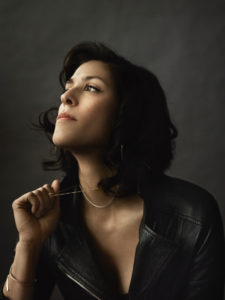SECOND HONORABLE MENTION, summer 2016
The Ghost Story Supernatural Fiction Award

BY DESSA WANDER
Matthias sleeps on his back. Tonight he has one arm flung out, one bent across his chest, like an archer painted on a cave wall. I lay down beside him, my head on his pillow. This close, I can hear the ringing in his ears that my nearness induces. His breath clouds when it hits mine. I wait until I’m sure he’s out, then leave for the night.
Back at camp, I play cards again with Misha, win more than I lose. She never gives much contest; drowned girls are over-tender, better fit for pictures than for poker. But she loses gracefully—lovely, blue, and luminescent as a television set. At my urging, she deals one more hand, dampening the deck.
Everyone here falls into one of a few categories, sorted, more or less, by the circumstances in which they left the Earth. As a rule, those who died by violence aren’t much for conversation. Their faculties are occupied in suppressing their hysteria. The suicides, meanwhile, amuse themselves with constant banter. They’re generally funny and smart, but self-absorbed—a clique of slender know-it-alls deciding how to hold their cigarettes. The lay-overs, who are here to settle a last bit of unfinished business, come and go too quickly to learn too much about. I stay up with whoever’s up and out late. I’m not in a position to be too choosy about my company.
Misha loses one more time then knocks against the tabletop to say good night. It’s late already, so I don’t try to make her stay. I walk the long way home, by the water. It’s dark, but I know the route. The midnight barge goes past, piled high with sleeping children. It’s headed west to Nightmare Island where it will dock until morning. There are still several hours before Mathias wakes up and my next shift begins.
I sing one of his songs while walking. The words are not romantic, something about a bear cub, but the melody is nice: sad for the verses and happy in the refrain. When I get close enough to see the shape of my house in the darkness, I switch to humming. My parents will almost certainly be asleep already. They stay curled so close they hardly need a bed for two.
My father died in Babylon, foolishly, beneath his own plowshare. Overrun—as he tells it with a wink—by the premonition of my mother’s love. The joke’s wrung out, but she blushes every time he makes it. She died in New York City in a famous factory fire. She leapt from the ninth story and—my father’s quick to add—straight into his waiting, broken arms. Their affair here went undetected for a long time. But they got careless after I was born, or maybe the secret just got too large to keep. A neighbor discovered and reported their tryst, though they managed to hide me for another whole year.
My parents’ mutual affection was deviant, enough to have them both expelled. Here love is not a reciprocal arrangement. Love is for export only, to be sent and spent on Earth—that’s fundamental to the nature of a ghost. But I’m told that even at my parents’ trial, they held hands. They refused to answer questions, their intertwining fingers revealing an inclination to haunt only each other. Finally the councilors brought in a living dog, at great expense and greater risk, to assist in the investigation. And they emptied the entire colony of every living ghost. Let off his leash, the beast found me immediately: in the bottom drawer of my mother’s vanity, asleep and lightly drugged with a thumbnail dosing of Valerian from my father’s garden.
There were angry meetings, votes, another public hearing. Almost everyone agreed that my parents were past redemption—but what should be done with me? There was no one else to take me. So, the three of us were sent to the camp’s farthest margin, exactly one inch shy of exile. And I grew up as the only native, the only ghost that had never lived or died. The council made it very clear that I wouldn’t receive any special consideration. I was expected to conduct myself like any other citizen. So when I came of age, having no natural tie to a particular place or person in the living world, I had the unusual task of choosing my own haunt.
I followed a few men around, each for a few days. I didn’t see much of a difference between them, so without too much deliberation I picked Matthias in Stockholm. Now, with so much feeling for him, it’s strange to think he meant so little to me at the beginning. In the seven years I’ve been following Matthias, he’s grown a beard, learned to work a table saw, moved north, and then farther north to Luleå. The local accent is muddy, so thick that it felt like learning Swedish all over again just to be able to follow his conversations at the grocery. He can cook now, but he never did fill out. When he takes off his shirt to step into the shower, he is slender to a degree that arouses all my sympathy. I sit on the bathroom sink, a hole in the steam. I like to hear him sing.
The sun stays up for days during midsummer in Luleå. Sometimes he does too—the locals call it sunsickness, a sort of mild mania from the constant light. On those yellow nights, I sit beside him on his doorstep while he rolls his cigarettes, sometimes draw circles with my finger in the smoke. We watch the sun pretend to set, then rebound before touching the horizon, like a skater who doesn’t land between her jumps. By the time the first hour of darkness arrives, he has blue rings beneath his eyes. I think maybe it’s a preview of how he will look when he gets old.
Matthias is clumsy, particularly when he’s tired. He’ll sometimes clip the doorframe of his bedroom with his shoulder and then spin off of it with a hurt expression, as if the floor plan had shifted deliberately to sabotage him. He’s dropped almost everything in the kitchen, but, in his defense, he catches most of it before it hits the floor. Once I saw him catch a falling pot of stew; the bit of it that had gone airborn landed right back in the pot, like a tower collapsing. After checking his shirtfront, still spotless, he laughed out loud at himself. I had never thought of that—laughing alone—and it was such a nice a habit that I started doing it too.
I know him so well now that it’s easy to forget that he doesn’t know me at all. But we’re very similar, I think. So maybe in knowing his own mind, he knows part of mine too. Sometimes, just for fun, when his phone rings, I pretend it’s me who’s calling and I fill in the other side of his conversation.
“Hej, how are you?”
I’m fine.
“Where are you?”
Sitting beside you.
“What are you up to?”
Sitting beside you.
Just recently he started doing push-ups in the morning. At first I thought maybe there was a problem—that he was struggling to get up—but it’s only an exercise. Now I do them alongside him on the braided rug, and we are up to thirty every day.
When there is a girl over, I know I should be slamming doors. Sometimes I do. But other times I just pace the ceiling in the kitchen and leave them at it. Girls are not over very often, though, so mostly it’s just us. I stack the coins on his dresser, or walk behind him to watch the short hairs stand against his collar. On the rare occasion that he’s photographed, out drinking with his friends from work, I loop my arm around his sharp shoulders to blur the shot. When he leaves the table to smoke outside, I cup my hands around his drink to keep it cold until he returns.
When he can’t fall sleep, Matthias watches old cowboy movies in bed. He has a TV on his dresser and a remote that he keeps under his pillow. If I lean the back of my head against the screen, it feels like we’re looking right at one another, like his eyes are fixed on mine. I bother him when he’s in bed sometimes, hoping he’ll turn on a movie for a while. But I don’t bother him while he’s driving or when he’s at work on the big machines.
When we’re together, I’m careful with him. But on these long walks, I let myself imagine that there might be an accident at the shop. And I imagine him following me, his heel slipping into each footprint as soon as I lift my toe out of it. I entertain the possibility that he might die in violence, or on purpose, or with a great deal left to do—so that he would come here where he could haunt me back. It can’t hurt just to imagine. But just a little bit, it does.
 Dessa Wander is a rapper and a writer signed to the Minneapolis indie label, Doomtree Records. She splits her time between a one-bedroom apartment in New York City and a fifteen-passenger tour van.
Dessa Wander is a rapper and a writer signed to the Minneapolis indie label, Doomtree Records. She splits her time between a one-bedroom apartment in New York City and a fifteen-passenger tour van.
